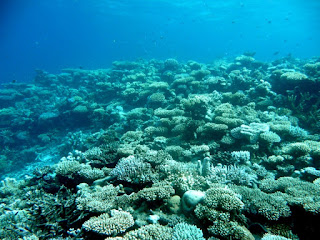We have seen in the last blog that the World's Reefs face a challenge unprecedented in the past due to a variety of reasons, such as bleaching due to elevated global temperatures, overfishing and pollution, blast fishing and coral mining to name but a few. Humans have had the biggest impact on coral reefs. This can be seen by looking at he geological record, where there is a clear analogue which can be measured against present day levels. Coral reefs are likely to have never been under this big a threat. They face complete eradication, but how can this be prevented?
Well, there are many factors affecting coral reefs, so it is likely that several different courses of action working in tandem will be required. Hughes et al. suggested that 'strong policy decisions to reduce the rate of global warming' were required to protect coral reefs. This was back in 2003, and there has yet to be a clear set of decisions made in order to reduce the impact on coral reefs. There has been a distinct lack in clear global action.
Despite the lack in concerted global action, there have been several localised attempts to preserve coral reefs. For example in the Maldives, where coral reefs have massive economic value, there have been numerous restoration projects including clipping and replanting of coral, in order to keep the population at acceptable levels.
 |
| Maldives Reef that has experienced bleaching. |
Banning the dumping of waste from farms, industry and households into the oceans and rivers and beach clean ups are both examples of simple methods that could be employed to ensure the future of coral reefs. Sustainable fishing is slightly harder to implement, however it would have a big impact on the coral. Healthy fish populations and healthy coral reefs go hand in hand. Not enough fish will result in algal blooms near the surface of the ocean. This will mean less sunlight will reach the coral further down in the water column. As they feed through photosynthesis you can see why this is a problem.
The main issue faced by coral reefs is the rising sea temperatures. In order for this to be reduced, the amount of co2 coming from anthropogenic sources needs to be reduced. This will involve a complete change in attitude from humans. We can't keep thinking it is alright to pollute the earth with little regard for the consequences. We need to stop the problem at its source, not focus on clearing up the problems afterwards. Reduction of co2 and changing attitudes will take a long time to take place however, and will involve lots of political protocol to organise such changes. Like Hughes said back in 2003, the world powers need to come together to solve this problem. In the meantime, 'stop gap' solutions will be required to allow the coral to recover and so that things do not get to the irreversible
stage.
Sources
- Climate change, human impacts and the resilience of coral reefs, Hughes et al 2003
- Phase shifts, herbivory and the resilience of coral reefs to climate change, Hughes et al 2007
No comments:
Post a Comment